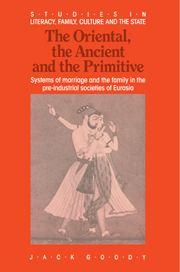 The Oriental, the Ancient and the Primitive
The Oriental, the Ancient and the Primitive Published online by Cambridge University Press: 09 January 2010
If we disagree with others we are not unquestionably wise, and they are not unquestionably foolish.
Article X of Prince Umayado's InjunctionsThis book is not a work of scholarship in the usual sense. I am not an expert in the societies which I discuss; I have read a little about them but what I know is derived mainly from field studies that others have made, the results of intensive research which exhaust neither the spatial nor the historical dimensions. Part of my original interest stemmed from an attempt to understand why the particular groups I first studied in Africa differ in certain definite ways from pre-industrial Europe. Reading the accounts presented by my colleagues of the domestic domain in the major civilisations of Asia to extend the contrast to that vast region I was led to wonder whether there too, certain general differences might not be related, among other factors but in some significant way, to differences in the productive systems.
The development of the analysis of social organisation in Africa meant that many conceptual clarifications have been made in the study of family, kinship and marriage. Models based on those societies have often been adopted in the examination of Asian societies. While these models were sometimes more appropriate than those of European historians and sociologists, they created problems for the analysis of Asian domestic systems, which tended to be seen as more ‘primitive’ than they really were and therefore as more of an obstacle in the onward march of ‘modernisation’ than was actually the case, thus reinforcing the ethnocentric notions of Marx and Weber about the place of oriental societies in world history.
To save this book to your Kindle, first ensure [email protected] is added to your Approved Personal Document E-mail List under your Personal Document Settings on the Manage Your Content and Devices page of your Amazon account. Then enter the ‘name’ part of your Kindle email address below. Find out more about saving to your Kindle.
Note you can select to save to either the @free.kindle.com or @kindle.com variations. ‘@free.kindle.com’ emails are free but can only be saved to your device when it is connected to wi-fi. ‘@kindle.com’ emails can be delivered even when you are not connected to wi-fi, but note that service fees apply.
Find out more about the Kindle Personal Document Service.
To save content items to your account, please confirm that you agree to abide by our usage policies. If this is the first time you use this feature, you will be asked to authorise Cambridge Core to connect with your account. Find out more about saving content to Dropbox.
To save content items to your account, please confirm that you agree to abide by our usage policies. If this is the first time you use this feature, you will be asked to authorise Cambridge Core to connect with your account. Find out more about saving content to Google Drive.